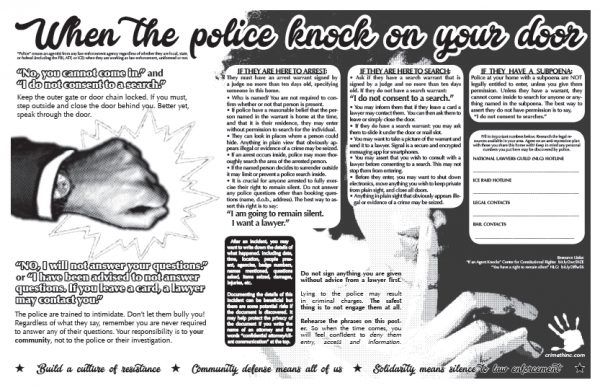Your Rights and Options: A Legal Guide and Poster.
In cooperation with legal counsel, our comrades have prepared a poster explaining how to handle visits from law enforcement. This includes any agent from any law enforcement agency, regardless of whether they are local, state, or federal, including the FBI, ATF, and ICE when they are working as law enforcement, uniformed or not. Consider putting a copy of this poster by the doors of your residence and familiarizing yourself with the information. These days, no matter who you are or what you’re doing, you never know when you might receive an unwelcome visit.
Download a pdf here: policedoorposter
Say “No, you cannot come in. I do not consent to a search.”
Keep the outer gate or door chain locked. If you must, step outside and close the door behind you. Better yet, speak through the door.
Say “No, I will not answer your questions.”
You can also say “I have been advised to not answer questions. If you leave a card, a lawyer may contact you.” The police are trained to intimidate. Don’t let them bully you! Regardless of what they say, remember that you are never required to answer anything they ask. Your responsibility is to your conscience and your community, not to the police or their investigation.
Research the legal resources available in your area. Keep the phone numbers accessible for the local National Lawyer’s Guild hotline, the local hotline to report ICE raids, and any contacts you have for legal support or raising bail money. Agree on a response plan with those you share this home with! Keep in mind that the phone numbers you have written out in your home may be discovered by police.
Do not sign anything you are given without seeking advice from a lawyer first.
Lying to police may result in criminal charges. The safest thing is to not engage with them at all.
Rehearse the phrases on this poster. That way, when the time comes, you will feel confident enough to deny them entry, access, and information.
If They Want to Conduct a Search
Ask if they have a search warrant that is signed by a judge. It must be no more than ten days old. If they do not have a search warrant:
- Say, “I do not consent to a search.”
- You may inform them that if they leave a card a lawyer may contact them. You can then ask them to leave, or you can simply close the door.
If they do have a warrant, you may ask them to slide it under the door or mail slot.
- You may want to take a picture of the warrant and send it to a lawyer. Signal is a secure and encrypted messaging app for smartphones.
- You can assert that you wish to consult with a lawyer before consenting to a search. This may not stop them from entering.
- Before they enter, you may wish to shut down electronics, move anything you wish to keep private from plain sight, and close all doors. The warrant may not apply to the entire house.
- Anything in plain sight that obviously appears illegal or evidence of a crime may be seized.
If They Have Come to Carry out an Arrest
They must have an arrest warrant signed by a judge that is no more than ten days old, specifying someone in this home.
- Who is named? You are not required to confirm whether or not that person is present.
- The best way to decline to answer is to say: “I am going to remain silent, I will not answer any questions without a lawyer.”
- If police have a reason to believe the named person is in the premises they may enter without your permission to search for the individual. They can check places where a person could hide. Anything in plain view that obviously appears illegal or like evidence of a crime may be seized.
- If the arrest occurs inside, police may more thoroughly search the area of the person arrested.
- On the other hand, if the named person decides to surrender outside, it may limit or prevent a police search of the house.
- It is crucial for anyone arrested to fully exercise the right to remain silent. Do not answer any police questions other than booking questions: name, date of birth, and address. The best way to assert this right is to say:
“I am going to remain silent. I want to speak to a lawyer.”
If They Have a Subpoena
Police who come to your home with a subpoena are not legally entitled to enter unless you give them permission. Unless they have a warrant, they cannot come inside to search for anyone or anything named in the subpoena. The best way to assert that they do not have permission is to declare “I do not consent to searches.”
After an incident, you may want to write down the details of what happened. Include the date, time, location, the people present, the agencies involved, the badge numbers of the officers, the names they mentioned, the questions they asked, the items they seized, and any damages, injuries, or other details.
Documenting the details of this incident can be beneficial; later, it may be important to have a record of all these details, and it is possible that they will be forgotten otherwise. In case there could be potential risks if the document is discovered, it may help protect the privacy of the document to write the name of an attorney and the words “Confidential attorney/client communication” at the top.


